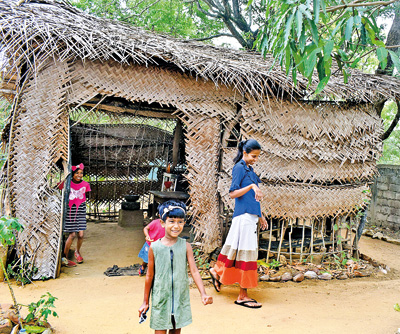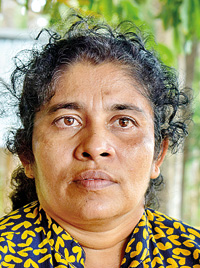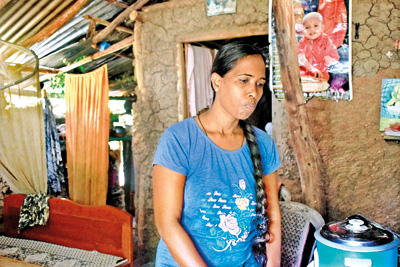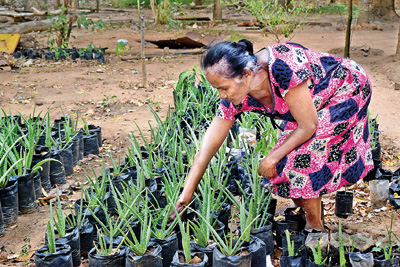News
Pangs of the pandemic: Covid devours village tourism that showcased Lanka’s rural lifestyle
Like many settlements around Habarana, the quiet and rustic Laksirigama thrived on a brand of “village tourism” popular with foreigners.

Lakshman's wife cooks meals for foreigners in this hut
Tourists would gather around hearths and watch women toss ingredients into bubbling, fragrant pots of curry. They would scrape coconut, grind chili and pick crisp new vegetables from organic home gardens. Then, they would sit around wooden communal tables and chow down on the steaming food fresh from the kitchen.
There were bullock cart rides, canoeing, countryside walks, tuk tuk tours and village market visits. The people of Laksirigama are not affluent. But they are enterprising. They had mapped out their lives for the next few years, ploughing back the money they earned into model kitchens, food shacks, roadside stalls and even simple rooms with attached bathrooms as low-cost accommodation.
Today, Laksirigama is deserted, except for the families that loiter in their yards or idly watch the empty road. Nearby Habarana is also shut down. So are Sigiriya and Hiriwadduna. Around this area, people, who built their fortunes on this particular brand of tourism, are living hand-to-mouth.
While the bigger hotels till this week’s new COVID-19 scare had attracted domestic holidaymakers, village tourism held no attraction for them. And it isn’t just the little restaurants that are affected.
Laksirigama resident R.A. Priyangani is a 42-year-old mother of three children. Her youngest child is just two. They live in a mud house on her grandfather’s land, for which they have no deeds. There’s no electricity or running water.
Before the pandemic, from a roadside stall, Priyangani sold village fare — limes, local oranges, mangoes, bael, woodapple, other seasonal fruit, herbal drinks and porridge. Some of it was picked from home gardens, some bought in Kurunegala. She left on foot at 6 a.m. and returned by 7 p.m. every day. She and her husband made enough for their family.
Priyangani now sweeps a house for Rs 300 a day. Her husband does odd jobs in the same home for Rs 1,500 day. But her son, who is sitting his A/Levels this month, works the hardest of all.

Kanthi: Breaks down in tears
“He needs money for classes and we no longer have any,” Priyangani said. “So he goes to school, and does odd jobs like shifting bricks, mining sand or loading stones onto trucks. He wants to do well at the exam. But he told me that, pass or fail, he will find a job after A/Levels to help his family. Even if he wanted to study further, we don’t have money.”
Priyangani brings out a sheaf of certificates. They are testimony to her son’s sporting abilities. He has even run a marathon in Colombo. She, too, is qualified. She has followed a course in traditional food and delivers talks on the well-being and protection of children. Recently, she received a letter that she had qualified for a job under the Government scheme for low-income earners. But the Grama Niladhari later said it had been withdrawn.
“I do what I can to earn a little money,” she said. “I can’t take what my husband makes. Anyway, he has nothing left when he buys provisions for the house.”
Kanthi Priyadharshani, 47, is a single mother of four. Her eldest is 24 and is unemployed. The youngest is 10. She has a restaurant. And before the pandemic, she built a separate area for foreigners to sit and eat village food: string beans, lake fish, tibbatu, drumstick, manioc and so on. She would make soup or drinks from local fruits. And she would show the tourists how these dishes are made.
Now, Kanthi’s only customers are other villagers or those on the Anuradhapura road who decide to stop to eat. “I cooked breakfast this morning,” she said. “Tibbatu, drumstick, pol sambol, lake fish, spinach… I haven’t had a single customer yet. I hope someone will turn up for lunch.”
The previous day, there were five customers. When there’s no money coming? She shrugged her shoulders and wept wordlessly. One of her sons is a certified tour guide. He, too, has no work. And she tried to grow fruits and vegetables in the backyard but elephants kept invading from the nearby jungle.
Lakshman Bandara has taken a lease on a safari jeep. He had huge demand for tours to Kaudulla National Park. Now he’s lucky to get one a fortnight. The 39-year-old father of five also built a separate dwelling with a room and attached bathroom for tourists. It has a stand fan, a mirror and a mosquito net and was popular with low-spending foreigners.

Priyangani and her family live in a mud house on her grandfather's land, for which they have no deeds. There’s no electricity or running water
At the back is a hut made of sticks and palm fronds. It has a hearth and a grinding stone, a table and other kitchen implements. Lakshman’s wife cooks meals for foreigners here. Some of the ingredients are picked from the organic garden. The tourists participate or sit on a low wooden bench, watching. And then shift to a dining area on the roadside to eat.
Lakshman’s children are aged between 13 and two-years-old. The two older ones go to school in Polonnaruwa and transport costs Rs 7,000 a month. In the past, their village tourism operation earned them at least Rs 30,000 a month. Now, there’s nothing. But, being a registered business, they still pay taxes on water and electricity.
“Some people around here don’t have more than one meal a day now,” said Lakshman. “They don’t even earn Rs 100. They are in dire straits and badly need assistance from the State.”
S.H. Violet lives with her sick husband and granddaughter. Before the pandemic, the 63-year-old carried out daily-paid work in hotels. She grew aloe vera and other plants for spice gardens that tourists loved. Anthuriums would go for Rs 100 a plant and aloe vera for Rs 25. And she also supplied sweetmeats to hotels and functions.
“I made enough for the month,” she said. “All that work, all the orders, they dried up. Today, we live on whatever my daughter provides us. She has a job away from home. Or if the veda mahattaya (traditional village doctor) wants aloe vera.”
Shifting to agriculture hasn’t been easy. Most residents of Laksirigama don’t have the means to start up, particularly at a time when the money they have goes towards filling empty stomachs. Seed material is expensive. One family said they spent between Rs 100,000 and Rs 150,000 to buy onion seeds. And only a portion sprouted successfully. But even that was afflicted by disease and rotted. Those without their own farmlands have to bear additional costs. Elephant intrusions are another challenge.

Before the pandemic, the 63-year-old Violet was a daily-paid work in hotels and she grew aloe vera and other plants for spice gardens that tourists loved
If the hotels and guesthouses have taken a hit in this continuing COVID-19 saga, so have little businesses like this. Because this is not an organised sector, their voices have gone unheard.
Village tourism may have earned the disdain of the travel industry because it did not draw big bucks. But it catered to a demand that was growing worldwide before the pandemic. And, today, those that quietly and unassumingly helped it bloom do not know where their next meal will come from.

